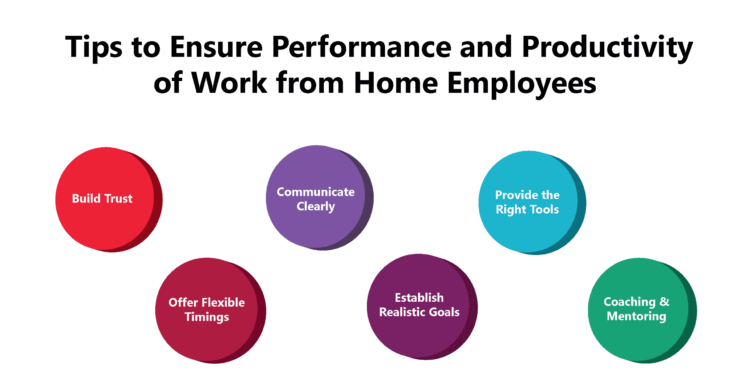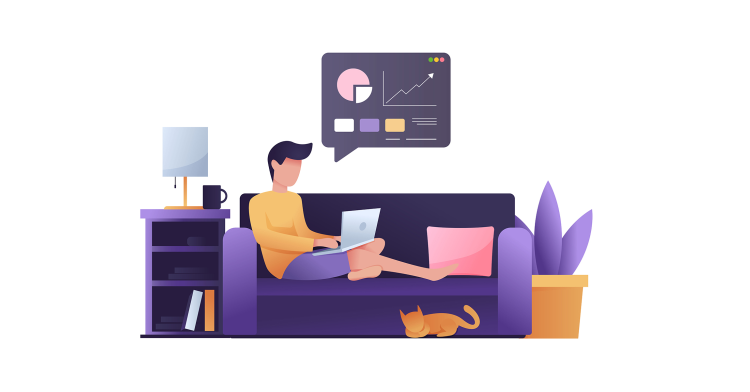1. Build trust and communicate clearly: Foster a trusting environment by assigning tasks and trusting employees to meet deadlines while maintaining open and transparent communication to avoid misunderstandings and errors.
2. Provide the right tools and flexible timings: Ensure employees have access to the necessary technology and support, and offer flexible work schedules to help balance professional and personal responsibilities, boosting productivity.
3. Set realistic goals: Avoid overburdening employees with unrealistic targets or low-priority tasks, which can decrease productivity and morale.
4. Regular coaching and mentoring: Offer ongoing support, coaching, and mentoring to help remote employees stay engaged and perform at their best.
The pandemic might have disappeared, but working from home might remain significant for many organizations. Thus, organizations are concerned about the performance and productivity of work-from-home employees, especially if it becomes the new normal.

For most organizations and supervisors, ‘work from home’ is an unknown and untested concept.
They have rarely been exposed to the concept of employees working in isolation every day, interacting with team members only digitally.
This discomfort about the current situation raised their concerns about the performance and productivity of their team members.
When handled correctly, working from home can be a blessing in disguise for most organizations.
Organizations can manage the performance and productivity of ‘work from home’ employees without using intrusive monitoring tools and technology.
Here are a few tips that can help organizations maintain employee performance and productivity while they are working from home:
1. Build Trust
2. Communicate Clearly
3. Provide the Right Tools
4. Offer Flexible Timings
5. Establish Realistic Goals
6. Regular Coaching and Mentoring


Organizations should create an environment of trust with their employees working from home.
This requires supervisors to assign work to employees and trust them to fulfill it within stipulated timelines.
Supervisors need to monitor the performance of their team members and ensure completion of the tasks/ projects assigned.
However, they should avoid monitoring and managing their team members continuously.
Employees should be accountable for completing the work and not using their time.

Effective communication is crucial in boosting employees’ efficiency and performance, especially when working from home.
This minimizes the chances of any miscommunication and avoids errors and rework.
Also, open and clear lines of communication between supervisors and WFH employees can help them get the necessary support.
It also facilitates the instant sharing of data and information required to accomplish the task.
Over-communication, on the other hand, might prove counterproductive and result in lower productivity.

Employees’ productivity may suffer without access to the right tools and technology to perform their tasks.
Hence, organizations need to make sure that their remote-working employees have proper access to these tools.
This would include computers/ laptops installed with the proper software, including communication and conferencing tools.
Organizations should also try to offer remote technical support for their work from employees.
They can also provide stable internet connections as per their needs and even work-from-home furniture if required.

While working from home might benefit some employees, it might also be challenging for others.
These employees need to shuffle between various professional and personal responsibilities constantly.
Hence, a flexible work schedule might prove beneficial for boosting the productivity of the employees.
While deadlines might not change, flexible work timings can help employees balance work from home and work at home.

A common mistake most organizations make is to burden WFH employees with unrealistic goals and low-priority tasks.
Organizations often believe that assigning employees enough tasks ‘to fill the time’ will result in higher productivity.
However, this can prove counterproductive as the employees may feel overburdened with work and underperform on the actual business goals.

Work-from-home employees need regular help and support from their supervisors and other team members.
Hence, it is important for supervisors to coach and mentor team members working from home.
They need to set aside some time regularly for this.
‘Work from home’ can be a double-edged sword for many organizations. However, if managed properly the performance and productivity of ‘work from home’ employees can be maintained at reasonably high levels.

Lead author: Sagar Chaudhuri, the Co-Founder and CEO of HiFives. He is an HR Tech Evangelist with over 25 years of corporate and entrepreneurship experience. In the past, Sagar has worked in leadership roles with companies such as Genpact, Infosys, and ICICI Bank. He has an engineering degree from IIT Kharagpur and an MBA from IIM Lucknow. Connect on LinkedIn
To stay updated on the latest HiFives blogs, follow us on Twitter (@MyHiFives)